Overspill prevention
Page 80

If you've noticed an error in this article please click here to report it so we can fix it.
A system to prevent overspill from road tankers during filling has been developed by Maxam Power, and Shell-Mex and BP.
Air sensing at very low pressure is used with pneumatic control and actuation. Liquid level sensors incorporating a float-operated valve are mounted in each tank compartment; these sensors form normally closed paths from the low pressure supply to exhaust.
Air is supplied via a metal-braided hose which is electrically conductive and earths the vehicle. The quickrelease hose coupling has an easy-break link to avoid damage should the driver inadvertently drive away without removing the hose.
Under normal conditions the restricted supply will build up pressure behind the closed valves and actuate a pilot valve in the pneumatic control system. When a compartment in the vehicle overfills, the float opens the valve in the sensor and the low-pressure signal exhausts to atmosphere de-energizing the pilot valve and stopping the filling process.
The one pilot valve controls all the delivery valves on the side of the gantry. Interlocks in the pneumatic system require the operator to clear the overfill condition before any further loading at the vehicle stance can take place. In addition, no further product can be with
from the loading arm in use until the meter delivery controls have been reset.
Trials by the company have shown that the system stops the delivery of petroleum within one second of the overfill condition occurring. This means that even at 500 gallon /minute delivery rate the overspill does not exceed the ullage space of approximately 5 per cent in the vehicle compartment.
Made by: Maxam Power Limited, Camborne, Cornwall.
























































































































